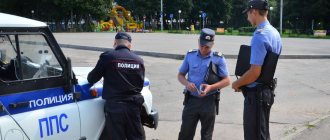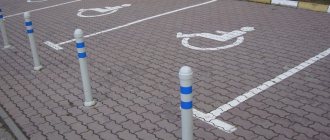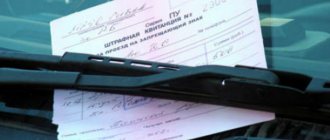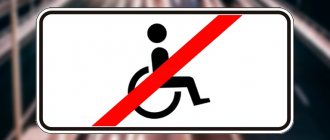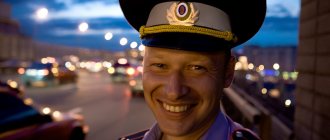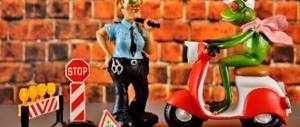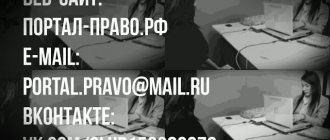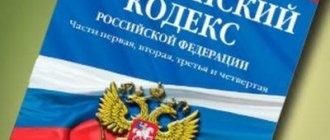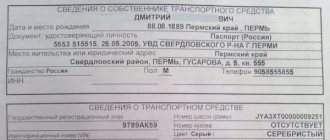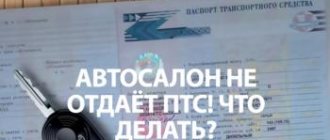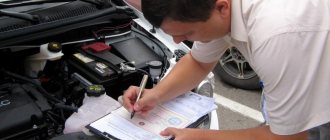Does he have the right to stop cars?
Yes. Moreover, regardless of the specific stopping place - be it a road, a residential yard, or even a parked car in terms of addressing the driver or his passengers.
As we indicated above, the district police officer is a police officer. Administrative regulations give all employees the right to stop cars, and not just traffic police inspectors.
As a result, we have that the district police officer has the following powers:
- stop the car
- stop pedestrians.
Drivers of vehicles have a similar obligation. Paragraph 2.4 of the traffic rules prescribes the right to stop for traffic controllers. On the one hand, a clear definition of a traffic controller is given in paragraph 1.2 of the Rules, and here such a person is the one who is given the competence to regulate traffic, and this may cast doubt on the existence of such a right by the district police officer. However, please note that not only traffic police officers are required to work for these purposes, but other police officers may also be involved (part 1 of article 10 of the Federal Law on Police and clause 10.5 of Order No. 205).
This leads to the corresponding responsibilities:
- the right to stop can only arise if there are exhaustive grounds for this: if there is reason to believe that you have committed a violation or crime,
- orientation to your car,
- reasonable grounds to believe that your car is involved in an accident,
- the need to interview witnesses in your car,
- The district police officer needs you as a witness,
- he needs to use your vehicle (clause 2.3.3 of the Traffic Regulations obliges you to provide it upon such a request),
- if the regulation requires you to be prohibited from traveling,
- and other reasons;
Do you have the right to stop the car?
Yes maybe. Moreover, anywhere - on the road, in the courtyard of a residential building, or even to the driver of a stationary car regarding questions regarding contacting passengers or the car owner.
Administrative regulations indicate that any police officer (not just a traffic police inspector) can stop cars.
As a result, we can list the rights of the local police commissioner:
- Stop vehicles.
- Stop pedestrians.
The corresponding duty to stop is prescribed by law for car drivers. In addition, the Traffic Rules give traffic controllers the authority to stop cars. The exact definition of a traffic controller is given in the traffic regulations, clause 1.2. It states that such a person may be the police officer who is granted the right to regulate traffic.
But does the district police officer have such authority? In the Federal Law on Police, Art. 10 part 1 says that other police officers may be involved in regulating traffic. The same right is described in Order of the Ministry of Internal Affairs No. 205, clause 10.5.
This entails the main responsibilities of the district commissioner:
- You can stop a car only if there are sufficient grounds.
- When a district police officer addresses a driver or another person, he must introduce himself, giving his position and last name.
- The police officer is obliged to present, upon your request, his official identification card in an unfolded form.
The first paragraph implies the following grounds for stopping the vehicle:
- Information about your commission of a crime or offense.
- We have received an orientation for your vehicle.
- There is evidence that your car was involved in an accident.
- Contacting you with a request to participate as a witness.
- You need to interview the witnesses in your car.
- The need to use your car for urgent business reasons, in accordance with the Traffic Rules, clause 2.3.3.
- Prohibiting the passage of vehicles when regulating traffic on the road.
- Other reasons.
Next, we will consider the issue of checking drivers’ documents.
Can I check documents?
And again yes. The logic of the official legislation of 2021 is the same here - since the district police officer is a full-fledged police officer in this regard, he has the right not only to stop cars, but also to check documents:
- from the driver,
- passengers,
- as well as for pedestrians as road users.
This is directly stated in paragraph 31 of the regulations of Order No. 664. At the same time, there are reasons for checking documents - as well as for traffic police officers:
- if the local police officer reveals a traffic violation,
- special measures to prevent violations and/or accidents,
- information about the involvement of your car in a previous accident,
- search directions.
If you were taken to the police station? Basic rules of conduct in the precinct.
- Answer briefly and monosyllabically, or you may not answer at all.
- Call your family or friends and tell them where you are
- Specify as much information as possible, namely why you were detained and what charges are being brought.
- Ask for a lawyer
- Don't sign anything
- Take photographs of all documents that are shown to you or that you suddenly signed.
1) Police officers are obliged to be polite and treat citizens with respect: According to paragraph 1, paragraph 2 of Art. 5 Federal Law “On Police”, paragraph. 1. The police carry out their activities on the basis of observance and respect for the rights and freedoms of man and citizen.p. 2. Police activities that restrict the rights and freedoms of citizens shall be immediately terminated if a legitimate goal has been achieved or it has become clear that this goal cannot or should not be achieved by limiting the rights and freedoms of citizens.
According to the PPS Charter, clause. 226. An employee of the PPSP unit in any conditions must be polite and tactful with citizens, address them as “you”, state their demands and comments in a convincing and understandable form, and avoid disputes and actions that offend their honor and dignity. In case of contact citizen patrol (guard) policeman is obliged to state his position, rank, surname, listen to him carefully, take appropriate measures within the limits of his powers, or explain whose competence it is to resolve the issue raised. 229.
We invite you to familiarize yourself with: Inspection and inspection. Differences and procedures
When talking with citizens, police patrol officers must show calm and restraint, must not enter into arguments, lose self-control, respond with rudeness to rudeness, and not be guided in their actions by personal hostile feelings. etc. 230. If the offender reacts excitedly to comments made to him, he must be given time to calm down and given the opportunity to give an explanation about his unlawful actions, and then explain the incorrectness of his behavior with reference to the relevant laws or other regulatory legal acts.
Only after this can a decision be made to draw up a protocol, deliver the offender to the internal affairs department (department), or limit himself to a remark. 2) In what cases can the police stop you and ask you to show your passport? By virtue of clause 2 of part 1 of Article 13 of the Federal Law “ About the police", the police can: p. 2.
Check the identity documents of citizens if there is data giving grounds to suspect them of committing a crime or to believe that they are wanted, or if there is a reason to initiate an administrative offense case against these citizens, as well as if there are grounds for their detention in cases provided for by federal law;
check from citizens, officials, public associations and organizations permits (licenses) and other documents to perform certain actions or to carry out a certain type of activity, control (supervision) over which is entrusted to the police in accordance with the legislation of the Russian Federation;
According to the PPS Charter, clause. 233. When checking, citizens’ documents must be handled carefully and not made any marks on them. If money and other securities are invested in the document, it is necessary to invite the owner to take them himself. There are sufficient grounds to suspect a person of committing a crime in accordance with Art.
91 of the Code of Criminal Procedure of the Russian Federation are the following circumstances: - when a person is caught committing a crime or immediately after its commission; - when eyewitnesses, including victims, directly point to this person as having committed a crime; - when on the suspect or his clothing, with him or obvious traces of a crime will be found in his home.
3) Police officers are required to introduce themselves and explain the reason for the appeal, Art. 5 of the Federal Law “On the Police” states: p. 4. When contacting a citizen, a police officer is obliged to: 1) state his position, rank, surname, present his official identification at the citizen’s request, and then state the reason and purpose of the appeal;
2) if measures are applied to a citizen that restrict his rights and freedoms, explain to him the reason and grounds for the application of such measures, as well as the rights and obligations of the citizen arising in connection with this.5. A police officer, if a citizen approaches him, is obliged to state his position, rank, surname, listen carefully to him, take appropriate measures within the limits of his powers, or explain whose competence it is to resolve the issue raised.
According to the PPS Charter, clause. Advertisement and responsibilities, etc. 7 tbsp.
5 of the Federal Law “On the Police” states: p. 7. The police are obliged to provide every citizen with the opportunity to familiarize themselves with documents and materials that directly affect his rights and freedoms, unless otherwise provided by federal law. 5) The police should not use physical force, or insult people, Art.
5 of the Federal Law “On Police” states: Art. 5) A police officer is prohibited from resorting to torture, violence, or other cruel or degrading treatment. A police officer is obliged to suppress actions that deliberately cause pain, physical or mental suffering to a citizen. 6) A citizen may refuse to give explanations to the police, in accordance with Art.
We suggest you familiarize yourself with: Individual entrepreneur taxes when renting out housing
51 Constitution, paragraph. 1. No one is obliged to testify against himself, his spouse and close relatives, the circle of whom is determined by federal law. 7) Personal search is regulated by paragraph. 16th century 13 of the Federal Law “On the Police” provides that the police have the right to carry out, in the manner established by the legislation on administrative offenses, personal searches of citizens, searches of things on them, as well as searches of their vehicles if there is information about what these citizens have with them weapons, ammunition, cartridges for weapons, explosives, explosive devices, narcotic drugs, psychotropic substances or their precursors or poisonous or radioactive substances, seize these items, means and substances in the absence of legal grounds for carrying or storing them;
take part in the inspection of passengers, their hand luggage and baggage on railway, water or air transport, the subway, or carry out such an inspection independently in order to seize things and objects prohibited for transportation by vehicles.” According to Article 27.7. KOAP, p. 1.
A personal search, an examination of things that are on an individual, that is, an examination of things carried out without violating their structural integrity, is carried out if necessary in order to detect the instruments or objects of an administrative offense. 2. Personal search and search of things in the possession of an individual are carried out by the officials specified in Articles 27.2, 27.
3 of this Code.p. 3. A personal search is carried out by a person of the same sex as the person being searched in the presence of two witnesses of the same sex. The search of things carried by an individual (carry-on luggage, luggage, hunting and fishing tools, harvested products and other items) is carried out by authorized officials in presence of two witnesses.p. 4.
In exceptional cases, if there are sufficient grounds to believe that an individual has weapons or other items used as weapons, a personal search, search of things on the individual may be carried out without witnesses. 5. If necessary, photography, filming, video recording, and other established methods of recording material evidence are used. 6.
A protocol is drawn up about a personal search, search of things in the person’s possession, or a corresponding entry is made in the protocol on delivery or in the protocol on administrative detention. The protocol on a personal search, examination of things in the possession of an individual, indicates the date and place of its preparation, position, surname and initials of the person who compiled the protocol, information about the individual subjected to personal search, the type, quantity, and other identifying characteristics of things , including the type, brand, model, caliber, series, number, other identification features of the weapon, the type and quantity of ammunition, the type and details of documents found during inspection that are in the possession of an individual, etc. 7.
In the protocol on a personal search, search of things in the possession of an individual, a record is made of the use of photography, filming, video recording, and other established methods of recording material evidence. Materials obtained during a personal search, examination of things in the possession of an individual, using photography, filming, video recording, and other established methods of recording material evidence, are attached to the relevant protocol.p. 8.
The protocol on a personal search, examination of things that are in the possession of an individual, is signed by the official who compiled it, the person against whom proceedings are being conducted for an administrative offense, or the owner of the things subjected to search, by attesting witnesses. If the person against whom the proceedings are being conducted, the owner of the things subjected to inspection, refuses to sign the protocol, a corresponding entry is made in it.
Sign up for a consultation
Does it have the authority to issue fines?
But this question is somewhat more complicated because of its two-sidedness. The fact is that the very concept of issuing a traffic fine in the form in which ordinary motorists call it has several administrative procedures at once:
- drawing up a protocol as the initiation of a case of an offense,
- consideration of the case as an authorized person,
- issuing a ruling with a fine or a ruling to close the case as its completion.
So, the district police officer has the right to draw up a protocol for all violations of traffic rules and other regulations by drivers, car passengers or pedestrians.
But not everyone can consider cases anymore. In our case, subclause 9 of part 2 of article 23.3 of the Code of Administrative Offenses of the Russian Federation lists the articles of the same Code, under which the district police officer is authorized to consider the case materials.
Simply put, if you can be charged under one of these articles of the Code of Administrative Offenses for a specific violation, then the local police officer has the right to do this. Here are these articles (we will list only those that apply to citizens and drivers in particular):
- 6.24 for violations of smoking in public places,
- 12.1 – driving a car that is not registered with the traffic police, including repeated driving, as well as the lack of technical inspection for the car,
- 12.2, part 1 – unreadable license plates,
- 12.2, part 2 – hidden, modified, missing numbers,
- 12.3, parts 1, 2 and 3 – driving a car without documents and handing over the steering wheel to such a driver,
- 12.22 – violations during training driving,
- 12.23 – violations of traffic rules for the transportation of people, including children without a restraint device, as well as organized transportation,
- 12.28 – non-compliance with the Rules in residential areas and courtyard areas,
- 12.29 and 12.30 – violation of the Rules by a pedestrian, car passenger or cyclist,
- 19.15 – living in a citizen’s home without a passport in cases where it is required,
- 19.15.1 – residence of a person without registration,
- 19.24 – violation by a citizen of measures of supervision over him,
- 20.1 – petty hooliganism,
- 20.20 – consumption of alcohol in a public place or drugs without a doctor’s permission/prescription,
- 20.21 – appearance in a public place in a state of intoxication.
When considering these cases, the district police officer already has the right to independently issue fines to citizens. But if other violations are detected, he can only initiate a case - draw up a protocol and then send it to an authorized official (for example, a traffic police officer at the department at the place of violation) or to the court of jurisdiction.
In conclusion, we note a full-fledged document, valid in 2021 on the territory of Russia and regulating the rights and responsibilities of the district police officer for its intended purpose. This is Order of the Ministry of Internal Affairs No. 205 dated March 29, 2019. It presents the comprehensive powers and competencies of this official, including:
- can he enter and forcibly enter residential premises,
- what tasks in general does he solve in the service,
- how he is obliged to bypass the territories under his jurisdiction,
- how to respond to citizens' requests,
- and his other powers.
Why might the police stop you?
A common opinion among drivers is that a police officer can only show a passport or other identity document, and to check a driver’s license and car documents, he must call the traffic police. In fact, paragraph 2.1.1. The traffic rules state that the driver is obliged, at the request of police officers (it doesn’t matter, traffic police, police department, police department, etc.) to hand over to them for verification:
- driver's license;
- vehicle registration documents;
- a document confirming the right to own or use a vehicle;
- for commercial transportation - waybill, cargo documents, etc.
At the same time, there are certain nuances associated with the internal structure of the Ministry of Internal Affairs. For each police unit and each employee there is a clear regulation in which cases he can stop a car in the performance of his official duties (in accordance with Article 18 of the Police Law). In particular, the PPS charter provides for the following powers of service employees to ensure road safety:
- Prevent cases of driving by drivers who show signs of intoxication or by persons under the required age.
- Stop various offenses that pose a threat to the life and health of citizens.
- Check documents for the right to drive a car, documents for the car and cargo.
- Inspect and search vehicles if they are suspected of being used for illegal purposes.
It should be noted that the functions of the State Traffic Inspectorate and the guard service were not always separate. In the 20s of the last century, the policeman was responsible, among other things, for road safety - for this he had a special red baton. Only in 1936 did the police have a separate “road” unit - the State Automobile Inspectorate.
However, despite the formal division of responsibilities, until now, employees of other departments of the Ministry of Internal Affairs have the right to carry out tasks of maintaining law and order on the roads. Thus, in the “Police Law” and the Traffic Rules there is no difference between the powers of traffic police officers and other police officers. Thus, the police officer has every right to stop cars and check documents.
So, from the point of view of the right to stop and inspect cars, there is no difference between traffic police officers and police officers. Now regarding the detection of traffic violations, detention and drawing up of an administrative protocol.
It is necessary to follow the traffic rules not only if there is a traffic police inspector nearby: any employee of the Ministry of Internal Affairs can fine you for many violations
According to Article 18 of the Police Law, a police officer “performs duties in accordance with his position and within the limits of his competence.” This means that a police officer can detain a violator, but he cannot draw up a report on traffic violations. His duty is to either call a traffic police squad or transport the offender to the nearest traffic police post.
But, at the same time, there are a number of articles of the Code of Administrative Offenses (CAO) in the field of road traffic, for which almost any police officer, including police officers, can impose a fine when performing their official duties (according to Order of the Ministry of Internal Affairs of the Russian Federation No. 403 dated May 5, 2012. These articles include:
- 12.1. Driving a vehicle that is not registered or has not passed technical inspection.
- 12.2. Driving a vehicle with missing, unreadable, fraudulent, non-standard or incorrectly installed license plates.
- 12.3. Driving a vehicle by a driver without the necessary documents or a license authorizing the transportation of passengers and cargo in a passenger taxi.
- 12.6. Violation of seat belt rules.
- 12.7. Driving a car by a person who does not have such a license.
- 12.10. Violation of rules for crossing railway crossings.
- 12.11. Violation of traffic rules on the highway.
- 12.12. Running a red light or a traffic controller making a prohibitive gesture.
- 12.13. Violation of traffic rules at intersections.
- 12.14. Violation of rules when performing maneuvers.
- 12.15. Violation of the rules when overtaking or placing on the road.
- 12.16. Failure to comply with road signs and markings.
- 12.17.-12.18 Not giving priority to pedestrians, route vehicles and cars with special signals.
- 12.19. Violation of stopping and parking rules.
- 12.20. Violation of the rules for using light and sound signals.
- 12.25. Failure to provide a car upon request to police officers or other persons required by law.
We invite you to familiarize yourself with: Kindergarten laws and parents’ rights
There are actually a lot of options. Let's look at the most common ones:
- Just. The policeman didn't like you. He disliked you.
- The policeman stops everyone. He was given this task.
- You match the leads that the police have.
- You are under the influence of alcohol or drugs.
- Someone pointed a finger at you as if you were someone who had committed a crime.
- You were in the wrong place at the wrong time. Such places include disadvantaged areas, as well as parks. The police go around and look for those who make bookmarks. If you are walking alone, the likelihood that you will be stopped is very high.
- Well, the most unpleasant thing. If they want to give you something forbidden.
What other rights and responsibilities?
Among other things, in relation to drivers the district police officer:
- is obliged to register an accident if it occurred on the territory under his jurisdiction or was entrusted to him by a certain official and is not within the competence of the traffic police (for example, a car was damaged by a structure or object - a fence, an icicle, a hooligan in the yard, and so on),
- may examine the driver for alcohol intoxication and send him for a medical examination if, within the framework of clause 10.5 of Order No. 205, he is given the authority to supervise traffic.
Consequences of failure to stop
Now let’s look at how the situation of not stopping at the lawful request of a policeman will turn out for the driver. In such a situation, liability arises in accordance with Art. 12.25 paragraph 2, Code of Administrative Offenses of the Russian Federation. According to it, such a driver faces a fine in the amount of 500 to 800 rubles.
This is one aspect of this issue. The second is that the law enforcement officer, in case of refusal to stop the driver, has the right to start a pursuit using special means (for example, special means “Hedgehog”, “Diana”, “Harpoon”) and even firearms. Therefore, think a hundred times before you refuse to respond to a police officer’s justified demand. Do you need such problems? Even if the demand seems illegal to you.
